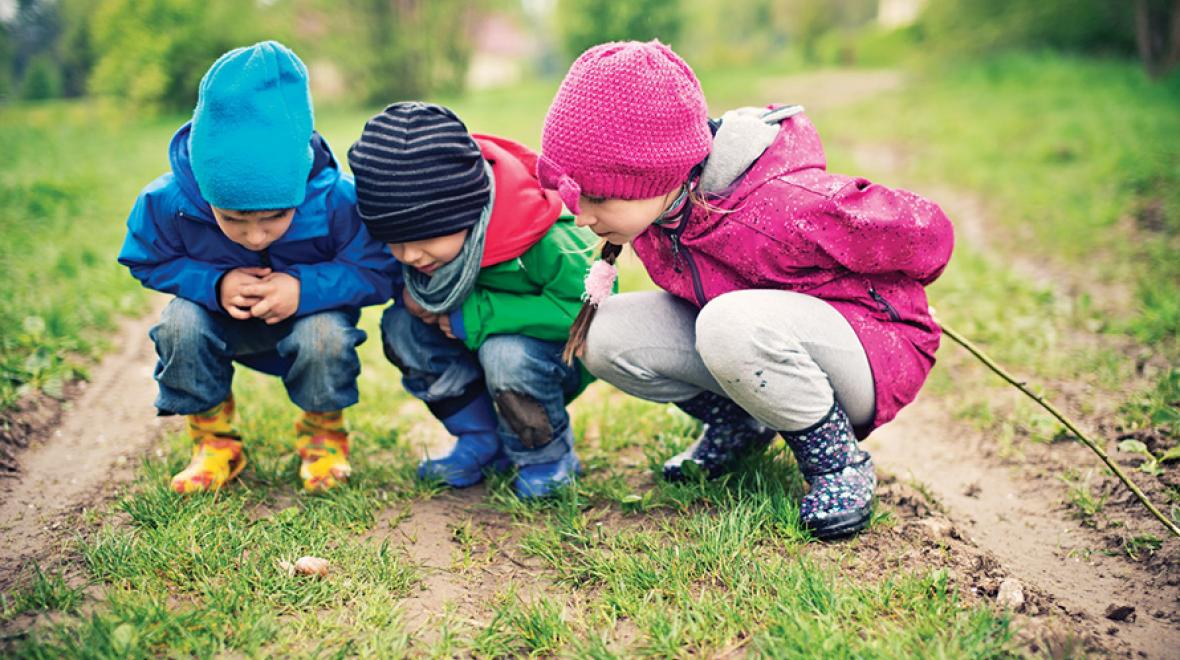
Teddy McGlynn-Wright looked at a lot of preschools for his daughter Charlie, and he noticed something: The kids sat at desks.
“Charlie has 15 years of desk-sitting ahead of her,” he says. She deserved something different. The answer, he found, was outdoor preschool.
Charlie, now 4, attends a Tiny Trees preschool. McGlynn-Wright says the family picked the school because it reflects something they deeply value: nature.
“We know that the vast majority of people who visit our national parks system are white people. Our children [Charlie and Theo, 2] are not white people. We wanted to make sure they knew nature belonged to them and was for them,” he says.
Attending Tiny Trees has made Charlie more comfortable in her body and with taking risks, McGlynn-Wright adds. One day, after arriving to pick Charlie up, he found her higher up in a tree than he’d ever seen. It was scary but exciting.
The biggest thing [about outdoor preschool] is that kids are moving all day.
“I loved seeing her confidence,” he says. “I know she benefits greatly from learning how to manage her own risk-taking.”
Soon, a lot more Washington state kids will get the chance to stretch their legs at outdoor preschools. This past spring Senate Bill 5357 became law in Washington state; it requires the Department of Early Learning (DEL) to create a pilot program for licensing outdoor early learning and child-care programs. Doing so allows such programs to run up to eight hours a day (currently, they’re limited to four hours). It also requires them to meet certain health and safety regulations.
The pilot program, which began on July 23, will roll out over the course of four years. If the program is successful, it will make Washington the first state to license outdoor preschools.
Outdoor preschools have long been popular in our region. The first in Seattle — the University of Washington Botanic Gardens’ Fiddleheads Forest School — opened four years ago. Now, there are more than a dozen nature-based preschools within Seattle city limits and more than 40 such programs in the state.
Outdoor-focused preschools have varied philosophies and curricula, but all focus on getting young children into nature for long periods of time. That’s no small feat these days. Modern kids spend less than half as much time outdoors as kids of previous decades did.
Even when kids are indoors, they’re less physically active; one study of 10 indoor Seattle-area child-care centers found that 3- to 5-year-olds moved for only 48 minutes a day. That’s less than the hour of play recommended by the Centers for Disease Control and Prevention and much less than other research that suggests two or more hours of activity is best.
Outdoor preschool can help kids get active, says Andrew Jay, cofounder and CEO of Tiny Trees, which has seven outdoor preschool locations in the Puget Sound area.
“The biggest thing [about outdoor preschool] is that kids are moving all day,” he says. “At an outdoor preschool, they’re moving all the time [and] engaging with other worlds.”
Of course, outdoor preschool isn’t a viable option for every family. Historically, one of the biggest drawbacks has been that four-hour cap. However, as part of the new pilot program, certain local establishments will be able to offer full-day service as soon as July 2018. The DEL keeps a running list of the participating programs here.
The pilot program may also help address the question of cost. Outdoor preschool advocates hope that the creation of state licensing regulations will pave the way for families to use state child-care subsidies at licensed outdoor preschools.
Jay saw something similar happen when Seattle launched a universal pre-K program in September 2015. Because of that initiative, half of the children who attend Tiny Tree’s full-week classes now have their tuition paid by the City of Seattle, he says. Jay hopes to see a similar system take hold for outdoor preschools as they gain acceptance by the state.
Sen. Kevin Ranker, D-Orcas Island, is already a fan. Ranker visited Orcas Island Forest School before he introduced Senate Bill 5357. While there, he learned a thing or two, including where caterpillars live. A preschooler taught him.
“He said, ‘My older brother learned about caterpillars from a book. Do you want to know how I learned about caterpillars?’” Ranker says. “He lifted a rock and said, ‘Right there!’”
You might also like...Our friends over at KCTS met up with local outdoor preschools for this fun video. Scroll down to see it! |











